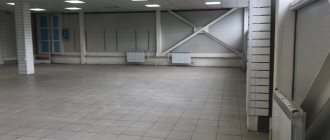The concept of reconstruction and redevelopment of residential premises
The definitions of reconstruction and redevelopment of residential premises are enshrined in Art. 25 of the Russian Housing Code. Reconstruction means the transfer, installation or replacement of utility networks, all kinds of equipment, including electrical or sanitary equipment, if they must be included in the technical passport.
What is meant by redevelopment and how does it differ from reconstruction? This concept is also enshrined in Art. 25 of the Housing Code of the Russian Federation and means a modification of the configuration of the premises, for which appropriate adjustments must be made to the technical passport.
The consequences of unauthorized reconstruction or redevelopment may arise if the relevant authority receives a complaint from neighbors or relatives. And also if a person wants to sell or donate his property.
Reconstruction
Facade works.
Reconstruction is work on the facade, including glazing of balconies and loggias, installation of window and door openings. In accordance with the Town Planning Code of the Russian Federation, it involves changing the parameters of capital construction projects, their parts, area and quality of engineering and technical support. For all types of reconstruction work, a project is required, and to combine loggias and balconies, permission from the Moscow Committee for Architecture is also required. Like reconstruction and redevelopment, reconstruction is carried out in compliance with legal requirements, i.e. based on the decision made by the authorized body. Do not forget that the facade of an apartment building is common property. Based on the fact that the disposal of property in shared ownership is carried out with the consent of all owners (Article 246 of the Civil Code of the Russian Federation), Art. 44 of the Housing Code of the Russian Federation indicates that the reconstruction of common property in an apartment building should be carried out on the basis of a decision of the general meeting of owners (including clause 14. Article 1 of the Town Planning Code of the Russian Federation).
Reasons for reconstruction or redevelopment
What are the grounds for reconstruction/redevelopment of residential premises? These activities should be carried out in accordance with legal requirements with mandatory approval from the relevant local authorities. The basis for re-equipment is a decision taken by these authorities.
In addition, to carry out conversion activities, the owner or his representative submits a list of documents to the body that issues the permit, including:
- application in a strictly defined form;
- documentation of a title nature for residential premises (this can be both originals and copies certified by a notary);
- re-equipment project, which is prepared and executed in accordance with the procedure established at the legislative level;
- technical passport of the premises that are planned to be rebuilt;
- consent in writing from each family member of the tenant occupying the relevant premises on the basis of a social tenancy agreement;
- a conclusion issued by an institution for the protection of architectural and historical monuments and cultural objects on the possibility of holding planned events if the premises are located in a house that is one of the architectural or historical monuments or is a cultural property.
The above reasons are exhaustive and no other documentation may be requested by the permitting authority for the conversion.
Rearrangement and redevelopment are considered to be unauthorized if they were carried out without a basis, which is provided for in Art. 26 of the Housing Code of the Russian Federation, as well as if deviations were made from the project that was submitted for re-equipment.
For Anapa, the issue of housing redevelopment remains relevant today. Citizens to this day address this issue to the Anapa department of the Rosreestr Office for the Krasnodar Territory, both verbally and by submitting an application for changes to the technical characteristics of real estate.
Taking into account the provisions of Article 219 of the Civil Code of the Russian Federation, paragraph 1 of Article 25 of the Federal Law of July 21, 1997. No. 122-FZ “On state registration of rights to real estate and transactions with it”, as well as the Town Planning Code of the Russian Federation, we will explain the following. What does reconstruction (redevelopment) mean? Reconstruction of a residential premises is the installation, replacement or transfer of utility networks, sanitary, electrical or other equipment that requires changes to the technical passport of the residential premises. Redevelopment of a residential premises is a change in its configuration, requiring changes to the technical passport of the residential premises. Redevelopment of residential premises may include: moving and dismantling partitions; disaggregation or consolidation of multi-room apartments; expansion of living space due to auxiliary premises, etc. Reconstruction or redevelopment of residential premises is carried out in compliance with the requirements of the current legislation of the Russian Federation in agreement with the local government body on the basis of a decision made by it. Meanwhile, if the redevelopment entailed a change in the external boundaries of the object, then in this case reconstruction takes place, namely: a change in the parameters of capital construction projects, their parts (height, number of floors, area, production capacity indicators, volume) and the quality of engineering support , in accordance with Article 1 of the Town Planning Code of the Russian Federation. What must be submitted to the local government? — an application in the form approved by the Government of the Russian Federation; — title documents for residential premises; — reconstruction and (or) redevelopment project; — technical passport of the residential premises; — consent of the tenant of the residential premises under a social tenancy agreement and his family members; - conclusion of the body for the protection of architectural, historical and cultural monuments on the admissibility of carrying out the designated work (if such a residential premises or the house in which it is located is an architectural, historical or cultural monument). Based on the accepted package of documents, an appropriate decision is made. Permission or refusal of reconstruction (redevelopment) is communicated to the applicant within the prescribed period by issuing an approval document (by the body that approves such work). Based on this, reconstruction and (or) redevelopment work is carried out. The completion of the reconstruction or redevelopment of the residential premises is confirmed by an act of the acceptance committee, which confirms the completion of the reconstruction or redevelopment. What is needed to complete all work to change the object? In accordance with paragraph 75 of the Methodological Recommendations on the procedure for state registration of rights to real estate and transactions with it, approved by Order of the Ministry of Justice of the Russian Federation No. 184 of July 1, 2002, and paragraph 67 of the Rules for maintaining the Unified State Register of Rights to Real Estate and Transactions with approved by Decree of the Government of the Russian Federation No. 219 of February 18, 1998, information that does not entail a significant change in the object, as well as termination or transfer of the right to it, includes, in particular, changes in real estate in connection with reconstruction or redevelopment (reorganization) without changing the external boundaries. The specified information is entered into the Unified State Register of Rights to Real Estate and Transactions with It on the basis of a document confirming the fact of changes in the relevant information previously entered into the Unified State Register of Rights, in accordance with paragraph 76 of the Methodological Recommendations on the procedure for state registration of rights to real estate and transactions with it, approved by Order of the Ministry of Justice of the Russian Federation No. 184 of July 1, 2002. Thus, in order to make changes to the Unified State Register of Rights, in accordance with Article 16 of the Federal Law of July 21, 1997. No. 122-FZ “On state registration of rights to real estate and transactions with it”, it is necessary to provide an application for amendments to the Unified State Register of Rights. According to paragraphs 21 and 1 of Art. 333.33 of the Tax Code of the Russian Federation, it is necessary to pay a state fee in the amount of 350 rubles for individuals and 1000 rubles for organizations, and provide supporting documents for making these changes. In the case of redevelopment of an apartment, the basis document is the cadastral passport, and in the case of redevelopment of non-residential premises - a plan of a secondary property. The completion of the reconstruction and (or) redevelopment of the residential premises is confirmed by an act of the acceptance committee. In accordance with paragraph 1 of Article 25 of the Federal Law of July 21, 1997. No. 122-FZ “On state registration of rights to real estate and transactions with it”, which regulates the registration of ownership of a newly created object; real estate after reconstruction is subject to state registration as a newly created object. Citizens who have unauthorizedly rebuilt their living quarters should be aware that the Housing Code of the Russian Federation provides for the negative consequences of such redevelopment. The owner or tenant of a residential premises is obliged to bring the housing, which has been unauthorizedly rebuilt or redesigned, to its previous condition within a specified (reasonable) period. If this requirement is not met, the court, at the request of the local government body, may decide to terminate the social tenancy agreement (in relation to the tenant), on the forced seizure of housing (in relation to the owner).
Acceptable reconstruction measures
In accordance with the Resolution of the State Construction Committee of the Russian Federation No. 170 dated September 27, 2003, which approved the Rules and Standards for the Technical Operation of the Housing Stock, reconstruction means:
- changing the location of gas and sanitary heating elements;
- replacing kitchen fireplaces or gas stoves with household electric stoves;
- arrangement of new bathrooms or reconstruction of existing ones;
- laying new or replacing existing pipelines, electrical networks and equipment for the installation of shower stalls, washing machines with increased power, and other units, both plumbing and household, that belong to the latest generation of equipment.
Responsibility for illegal redevelopment
Reconstruction and redevelopment of residential premises for which permission has not been obtained is generally considered illegal. Responsibility for such actions is determined by Art. 7.21 of the Code of the Russian Federation on Administrative Offenses, which concerns unauthorized refurbishment or redevelopment of such premises. This article provides for administrative liability for damage to the premises, which may consist of both direct damage and damage to the equipment located in it. What is meant by damage? This is bringing a living space to a condition that makes it unsuitable for people to live in. Damage to equipment means rendering water and gas supply systems, heating systems, etc. unusable.
There is an article of the Code of Administrative Offenses of the Russian Federation (Article 19.1), according to which actions can be qualified as arbitrariness. Also Art. 7.22 provides for liability for reconstruction that was carried out without the owner’s approval, if this significantly changes the operating conditions of the residential premises.
The authorized body that examines the commission of such offenses is the Housing Inspectorate. Consideration of the submitted complaint and taking action on it occurs within a month.
Acceptable redevelopment measures
To carry out the redevelopment, the following activities are carried out:
- dismantling or moving partitions;
- consolidation or, conversely, disaggregation of premises with a large number of rooms (their combination or delimitation);
- construction of new or relocation of existing doorways;
- arrangement of additional bathrooms and kitchens;
- dismantling utility rooms, for example, storage rooms or dressing rooms, to increase living space;
- elimination of dark kitchens and passages through them through living spaces;
- re-equipment of vestibules available in the premises.
Redevelopment is not allowed:
- if there is a deterioration in the living conditions of people and the operation of the house itself, including if access to utilities and any disconnecting devices is limited;
- in a house registered with the headquarters for civil defense and emergency situations;
- in residential premises that are declared unsuitable for living;
- if as a result natural ventilation channels are completely eliminated or reduced;
- if the load on the supporting structures increases.
Apartment redevelopment
Redevelopment means making changes in the configuration of residential or non-residential space with the obligatory introduction of a special amendment to its technical passport. Such changes are implemented according to the sketch or project.
Changes to the sketch include:
- Sealing and arrangement of doorways.
- Partial or complete remodeling of partitions (except for inter-apartment partitions).
- Installation or replacement of additional engineering equipment.
- Creation of new partitions (the load on the floors should not increase).
As for the changes in the project, they are already more serious. These include:
- Installation in ceilings of both openings and internal staircase structures.
- Arrangement of openings in inter-apartment partitions and supporting walls for the purpose of horizontally combining 2 nearby apartments.
- Changes in floor designs.
- The installation of partitions in which the load on the load-bearing wall increases.
A sketch and a project differ from each other in that the first can be shown directly on the plan of a document indicating the physical condition of the premises. If the redevelopment is implemented according to the project, then it must be approved. And to directly draw up such a project, you need to resort to the services of qualified specialists from a licensed bureau.
Technical passport of residential premises
A technical passport of a residential premises is a document that contains all the technical data of the premises. The technical passport is drawn up during the initial inventory, which is carried out when a new house is put into operation. It is not the developer, but the owner of the residential premises, who is responsible for the preparation of the document.
The data sheet contains the following information:
- floor plan of the living space;
- inventory value of the premises;
- what materials are the walls made of?
- main characteristics of floors and foundations;
- when was the housing built;
- how many rooms are there;
- its footage, etc.
A registration certificate for residential premises is required when making transactions for the alienation of premises, to coordinate reconstruction or redevelopment, to allocate a share in kind in shared ownership, and also to establish the amount of tax on residential premises. In addition, the technical passport of the premises will also be needed when registering an inheritance.
Why is it important to legalize redevelopment
If permission to redevelop the apartment has not been obtained, this fact will be revealed during any transactions with it, for example, the owner will want to donate it or sell it. When re-registration of property rights occurs, the owner, among others, must provide 2 documents:
- technical certificate of the premises;
- a certificate issued by the BTI, which shows the floor plan: size of rooms, ceiling height, placement of walls.
In this case, it will become obvious that the data in the technical passport does not coincide with the actual data. The redevelopment can be legitimized only in court if it does not threaten the safety of the house as a whole.
If the redevelopment poses a threat to the safety of the entire structure, the owner will be required to pay a fine and will be offered to return everything to its original state. If the requirements are not met, the court may make one of two decisions:
- if we are talking about the owner of the premises, it will be sold at public auction, and the owner will be paid the amount received minus legal costs;
- if the redevelopment is carried out by the tenant, the contract with him will be terminated. The owner will be required to restore the premises to their original condition.
Thus, illegal redevelopment or reconstruction of residential premises can have the most unpleasant consequences for the owner, and therefore it is better to carry out these activities after obtaining permits.
Author of the article
How do they find out about illegal redevelopment?
The homeowner does not always even understand that his repairs are illegal. This may take several years, and then the housing inspector will come with an inspection, issue a fine and force you to return it to the way it was.
You can find out from the BTI that your apartment is undergoing large-scale renovations from your neighbors. They will go and complain about noise, suspicious work.
Also, inspectors from utility services may come to the apartment on another issue, but having noticed what is happening, they will inform you where to go. And the regulatory authority will come with an inspection.
Illegal redevelopment may be discovered if they want to sell the apartment. The discrepancy in the technical passport will definitely be noticed and the property will no longer be sold for the real market price.
Dear readers! We cover standard methods for solving legal problems, but your case may be unique. We will help you find a solution to your problem for free
— simply call our legal consultant at:
+7 (495) 128-73-40 (Moscow)
+7 (812) 603-71-55 (Saint Petersburg)
8 (800) 302-33-75 (free call within Russia)
It's fast and free ! You can also quickly get an answer through the consultant form on the website.
And if the apartment was insured, and something happens to it, the insurance company will legally refuse to pay.









